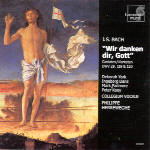This disc contains several of my favorite Bach cantatas, and some of his grandest choral and brass writing. The program also makes a perfect introduction to the world of the cantatas in general for anyone who loves Bach’s instrumental music or larger vocal works (like the B minor Mass), but who has been hesitating before taking the plunge into the vast sea of his cantata production. Why? Simple: two of these pieces contain music found elsewhere in Bach’s output. For example, the first chorus of BWV 120 became the concluding number (Et expecto) of the B minor Mass “Credo”. BWV 29 opens with an almost shockingly brilliant arrangement (as an organ concerto) of the opening movement of the E major violin partita, followed by the chorus that appears in the B minor Mass as both the “Gratias” and the “Dona Nobis Pacem” (the German original means exactly the same thing as the Gratias: “We thank thee,” making the adaptation entirely apropos). All three cantatas feature brilliant writing for trumpets (four of them in BWV 119) and drums, and were written for civic ceremonies in Leipzig. And if the words are often less than inspiring to us now, no one can argue that Bach didn’t rise to the occasion musically.
Philippe Herreweghe’s performances of these three jubilant pieces offer all of the joy and vigor that one could hope for. The balance between chorus and orchestra allows the tricky exchanges between trumpets, voices, and other instruments in the chorus “Jauchzet, ihr erfreuten Stimmen” from BWV 120 to emerge with perfect naturalness. In general, the brass playing is terrific. Check out the zesty recitative with fanfares “So herrlicht stehst, liebe Stadt!” in BWV 119, for example. The solo singing also reaches a very high standard, especially from the women. Ingeborg Danz warbles her way through the impossibly florid opening aria of BWV 120 with the same instrumental aplomb as the oboe obbligato. Deborah York’s crystal clear soprano provides a delightful contrast in the same work.
Herreweghe adds a harpsichord to the continuo in BWV 29, appropriately only for the opening concerto and two subsequent arias, and his flowing treatment of the final chorales in all three works offers solemnity without somnolence. The trumpet-capped conclusion to BWV 29 (placed third in order of performance) sets the seal on a remarkable disc that contains not a single dull moment from beginning to end, and which has been thoughtfully programmed to make ideally contrasted, continuous listening. [4/28/2002]
































